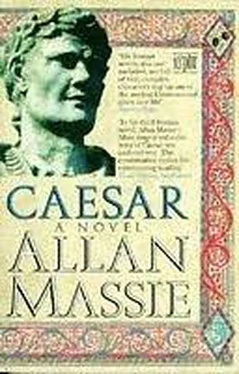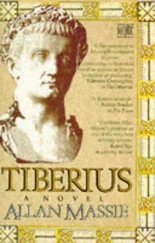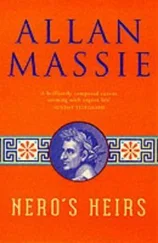Allan Massie - Caesar
Здесь есть возможность читать онлайн «Allan Massie - Caesar» весь текст электронной книги совершенно бесплатно (целиком полную версию без сокращений). В некоторых случаях можно слушать аудио, скачать через торрент в формате fb2 и присутствует краткое содержание. Жанр: Исторические приключения, на английском языке. Описание произведения, (предисловие) а так же отзывы посетителей доступны на портале библиотеки ЛибКат.
- Название:Caesar
- Автор:
- Жанр:
- Год:неизвестен
- ISBN:нет данных
- Рейтинг книги:3 / 5. Голосов: 1
-
Избранное:Добавить в избранное
- Отзывы:
-
Ваша оценка:
- 60
- 1
- 2
- 3
- 4
- 5
Caesar: краткое содержание, описание и аннотация
Предлагаем к чтению аннотацию, описание, краткое содержание или предисловие (зависит от того, что написал сам автор книги «Caesar»). Если вы не нашли необходимую информацию о книге — напишите в комментариях, мы постараемся отыскать её.
Caesar — читать онлайн бесплатно полную книгу (весь текст) целиком
Ниже представлен текст книги, разбитый по страницам. Система сохранения места последней прочитанной страницы, позволяет с удобством читать онлайн бесплатно книгу «Caesar», без необходимости каждый раз заново искать на чём Вы остановились. Поставьте закладку, и сможете в любой момент перейти на страницу, на которой закончили чтение.
Интервал:
Закладка:
CHAPTER 2
It is not my intention to describe our campaign in Italy or the civil war that followed. For one thing, I do not know how much time I shall have to write this memoir; for another, I have too painful memories of the later wars so disastrously completed. Completed, that is, as far as I am concerned.
Some will see my detention here as justice. Ironic, or poetic, justice perhaps. How do I see it?
Well, let me say this. Caesar boasted of his clemency. He confined it to Roman citizens. He forgot clemency when it came to foreigners.
Take the case of the Gallic leader, Vercingetorix, for example. He was chief of the Arverni, a man of great beauty, courage and guile. I took part in that terrible campaign of Alesia. It was my first experience of total war. I rejoined the army while we were laying siege to the Gallic stronghold of Avaricum. It was winter. The snow lay knee-deep on the mountain roads. One of my fingernails fell off on account of the cold. Vercingetorix destroyed granaries and storehouses in an attempt to deny us food. Our legionaries were near despair. Caesar rallied them with insults and affection. We made a direct assault, and took the town. Caesar ordered or permitted — I have never been certain which — a general massacre.
"Why not?" Casca said. "There is food here for an army, but not for the civilian population." He was commanding a detachment sent to guard the corn-stores to prevent looting. Half the town was ablaze. The confusion was terrible. Women were raped before having their throats cut. Only a fortunate few were able to attach themselves to the army. Caesar g azed on the horror with equanimity. "The men have suffered much to achieve this," he said.
The Gauls did not despair. Vercingetorix threw himself into his citadel of Alesia. We laid siege to it. Soon we were ourselves besieged. A new Gallic army descended on us, invested our lines which were themselves investing the city. Only a commander of supreme rashness could have found himself in such a trap; only one of rare nerve and audacity could have saved us.
Caesar remained calm.
"Caesar is not destined to die in a barbarian land," he said, and touched his forehead.
One day, to our amazement, we saw the gates of the city open. We stood to arms, expecting an attack. It was not soldiers who began to descend the hill towards us, but a host of old men, women and children.
"So," Casca said, "supplies are running low there too."
They extended their hands towards us, pointed to their mouths, and cried out in their strange gibberish for food. Caesar gave orders that none was to be provided; neither should they be admitted to our lines: "Not even pretty girls or boys," he said. "It will do the garrison no harm to see their loved ones starving to death before their eyes."
For three days they kept up their wretched supplications. For three nights our sleep was disturbed by their piteous cries. Many of us were disgusted. A soldier does not cease to have tender feelings. But Caesar was adamant. When he found that one centurion had actually been rash enough to take possession of a lovely girl, he ordered him to be flogged, and demoted to the ranks. Then the girl was whipped out of our lines to resume her starvation.
Eventually the wretched people began to slink away. Where they went, whether any escaped, I have never known. Simply, after a few days, they had vanished. No doubt they crept into the woods to die.
By this time the relieving army had invested us. Caesar later claimed that there were eight thousand cavalry and a quarter of a million infantry. That is what he reported to the Senate, but it was sheer bravado. We had no means of knowing how many they were.
I am not going to recount the battle. It was like all battles, only worse than most. Truth to tell, accounts of battles rarely make sense. No, that is not true; they make too much sense. Historians give them a shape they don't possess. They credit commanders with a degree of control that is absent. I don't advise anyone to read Caesar's account of Alesia; talk to some of the legionaries who fought in the front line instead. As for me, I recall nothing of it. Trebonius later joked that I was as drunk as Antony, but that wasn't true. I might as well admit now that my memory has been obliterate d by the fear I experienced. I had dreamed that I would die, and I very nearly did.
Eventually Vercingetorix led an attack from the town. I think he mistimed it. Half an hour earlier, before we had secured our position against the relieving army, he might have swept us away. Even so, we might have lost if the cavalry, disregarding an order from Caesar that they were to hold their ground, had not essayed an encircling movement. When the Gauls saw what was happening, many panicked and ran back into the city. It was that moment of terror which decided the day. We were able to move forward, a mass of metal, swords thrusting; we clambered over the bodies of our enemy and pursued those who still stood back into the citadel. When the gates closed against us, I knew Vercingetorix was doomed.
The next day he sent out a herald proposing terms. Caesar said he would discuss these only with Vercingetorix himself.
The Gallic leader rode out of the stronghold that had become his prison. He was mounted on a white horse. There was a sword-gash over his right eye, but he sat straight, proud as a bridegroom. When he dismounted he still stood a head higher than Caesar, who waited for him to make obeisance. The Gaul declined to do so.
He spoke in Latin, not very good Latin, but Latin all the same. He conceded victory, and asked for mercy for his troops and tribesmen. The stench of dead bodies and blood filled the air.
Without addressing his noble enemy, Caesar summoned two centurions and told them to load the Gallic chief with chains.
"Caesar does not debate with barbarians," he said, though during the years he spent in Gaul he had done so on many occasions.
Then he gave out orders. The two tribes of the Arverni and the Aedui would be spared; they should resume their position as friends of the Roman people. (This was clever: the Arverni were Vercingetorix's own tribe.)
"They have been led astray by evil counsel," Caesar said, still not deigning to address Vercingetorix himself or even to look him in the face.
All the other prisoners should be allotted to the legionaries. First, however, they should dig a pit for the dead.
Then he said to the centurions, "Take this man and keep him closely guarded."
He never spoke to Vercingetorix again. But he had a role for him. He was to be preserved to feature in Caesar's Triumph. That didn't happen for several years. Afterwards, as you know, Vercingetorix was strangled in the Mamertine prison. Vercingetorix received these insults that day with the utmost serenity. Caesar was the conqueror; but the day belonged to his defeated enemy. I felt ashamed of Caesar that night.
(Later: I gave this account to young Artixes, the son of my captor. He has spent some time in Rome, and reads Latin easily. He is a comely young man of some charm, and I believe he sincerely pities me. He is also, as it happens, on his mother's side, a cousin of Vercingetorix himself. I was interested to see how my account struck him.
Naturally some will say, reading this confession, that I wrote it in an attempt to curry favour with him. That would not have been unintelligent, but such was not my purpose. Actually I was surprised to discover while writing how strongly I felt. This is something I have noticed before, and it raises the philosophical question as to whether such writing actually alters one's feelings, whether it is not indeed an aid to insincerity. It is not a question I can answer. The truth is, as ever, complicated: we can never recapture our precise emotions, and brooding on past events is coloured by what has happened since.
Читать дальшеИнтервал:
Закладка:
Похожие книги на «Caesar»
Представляем Вашему вниманию похожие книги на «Caesar» списком для выбора. Мы отобрали схожую по названию и смыслу литературу в надежде предоставить читателям больше вариантов отыскать новые, интересные, ещё непрочитанные произведения.
Обсуждение, отзывы о книге «Caesar» и просто собственные мнения читателей. Оставьте ваши комментарии, напишите, что Вы думаете о произведении, его смысле или главных героях. Укажите что конкретно понравилось, а что нет, и почему Вы так считаете.












